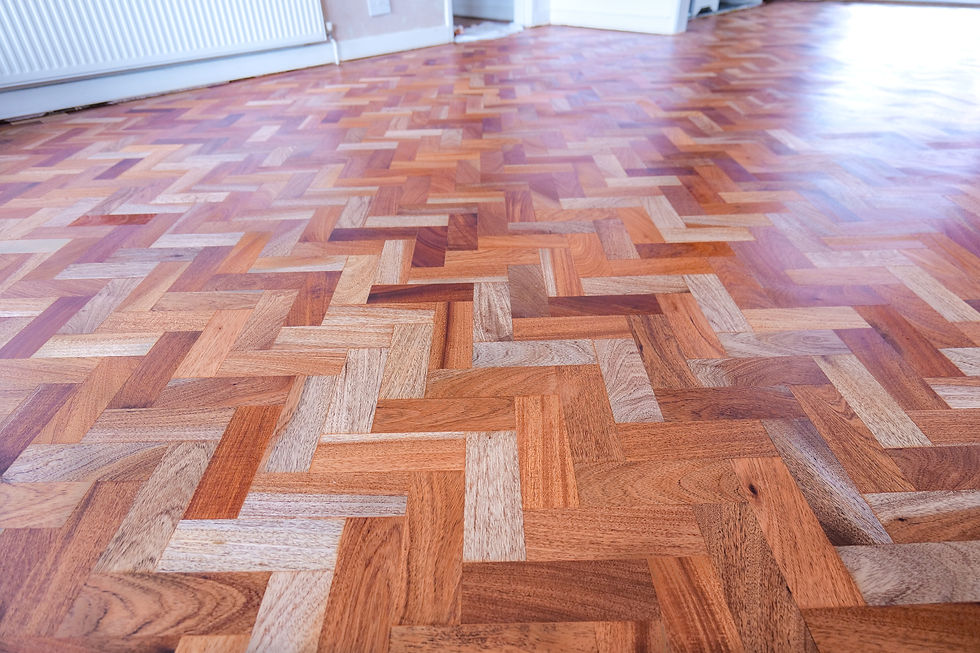The Ultimate Guide to Wood Floor Finishes: Which Option Is Best for Your Home?
- axholmecleaning
- Dec 20, 2024
- 4 min read
Choosing the right wood finish for your floors is essential for enhancing both the beauty and longevity of your space. With so many options around, it can feel daunting to know which finish will best meet your needs. This guide simplifies the decision-making process by giving you clear insights into different wood finishes, their benefits, and the key factors to consider when making your choice.
Understanding Wood Finishes
Wood finishes not only provide protection but also enhance the natural beauty of your flooring. The most common types include oil-based, water-based, and penetrating finishes, each with its unique benefits.
Oil-Based Finishes: Known for their durability and ability to deepen wood tones, oil-based finishes are ideal for high-traffic areas. They resist wear and tear, making them excellent for living rooms or hallways. For example, finishes like polyurethane can withstand up to 10 times more wear than water-based options. However, keep in mind they may take up to 24 hours to dry and can have a strong smell during application.
Water-Based Finishes: These finishes dry quickly, often within 2-3 hours, and have low levels of volatile organic compounds (VOCs). They preserve the natural colour of lighter woods, such as maple or birch, making them ideal for maintaining a fresh look. Nonetheless, they might not offer the same level of durability as oil-based finishes, especially in high-traffic areas.
Penetrating Finishes: Finishes like oils and waxes soak into the wood, creating a natural appearance. They may require more frequent maintenance, like reapplication every 4 to 6 months, but offer the flexibility of easy spot repairs without the need to sand entire sections.
Factors to Consider
Before selecting a wood finish, consider these essential factors that will influence your choice:
1. Traffic Levels
The amount of foot traffic your space sees is crucial in determining the right finish. For high-traffic areas like entryways, a durable finish is paramount. For example, a study found that homes with oil-based finishes lasted on average 3 years longer under heavy foot traffic compared to water-based finishes.
2. Aesthetic Preferences
Your chosen finish should reflect your design style. Darker finishes can add a touch of elegance and warmth, while lighter stains can create an open feel. For instance, a dark walnut finish can make a living room feel cosy, whereas a natural ash finish can brighten up a room.
3. Maintenance Requirements
Different finishes require varying levels of upkeep. If you prefer low-maintenance options, then water-based finishes might be more suitable, as they often only require occasional cleaning. On the other hand, if you don't mind regular maintenance, oil-based finishes can offer a deeper colour and character over time.
4. Application Process
The application complexity can also guide your choice. Some finishes are user-friendly for DIY enthusiasts, while others may necessitate professional skills to achieve a flawless look. For instance, lacquer finishes typically require professional-grade tools and expertise due to their complex application processes.
Types of Wood Finishes
Now that you understand what factors to consider, let’s look at the specific types of wood finishes available:
1. Polyurethane Finishes
One of the most popular choices, polyurethane finishes offer high durability and resistance to scratches and stains. They are available in both oil-based and water-based varieties. For example, an oil-based polyurethane can provide a warm amber glow while a water-based version keeps the wood's natural look.
2. Varnish Finishes
Varnish consists of oils, resins, and solvents, forming a hard, protective layer. It's great for home use and outdoor applications due to its excellent resistance to UV rays and moisture, making it perfect for patios or sunrooms.
3. Shellac Finishes
A traditional finish, shellac dries quickly and gives wood a sought-after shine. However, it may not be the best choice for high-traffic areas due to its lower durability.
4. Oil Finishes
Linseed or tung oil finishes penetrate the wood, amplifying its grain and providing a natural look. While aesthetically pleasing, they require reapplication every few months to sustain their protective qualities.
5. Lacquer Finishes
Lacquer offers a hard, glossy surface that protects well. Due to their complex application process, they are generally better suited for professionals.
Application Tips
Once you've chosen the right finish, applying it correctly will significantly affect the outcome. Here are some tips to ensure success:
1. Prepare the Surface
Make sure your wooden floor is clean and dry. Remove any old finishes by sanding in the direction of the wood grain for a better surface.
2. Choose the Right Tools
Invest in high-quality brushes or rollers suitable for the finish you have chosen. For larger areas, a paint pad can help achieve an even application.
3. Apply Thin Coats
Applying several thin coats instead of a single thick one is beneficial for a smooth finish. It prevents bubbling and promotes even drying.
4. Ventilation is Key
During application, ensure good ventilation to aid drying and reduce fumes, especially with oil-based products.
5. Follow Manufacturer’s Instructions
Stick to the manufacturer's guidelines on drying times and application methods for the best results.
Wrapping It Up
Choosing the perfect wood finish for your floors involves careful consideration of traffic levels, style preferences, and maintenance expectations. With a solid understanding of the available options, you can make an informed choice that elevates both the appearance and resilience of your wooden floors.
By preparing your space thoroughly and applying the finish with care, you can achieve a beautiful and lasting result. Enjoy the timeless elegance that the right wood finish can bring to your home.

Comentarios